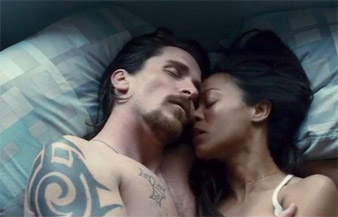The 400-Word Review: Out of the Furnace
By Sean Collier
December 6, 2013
BoxOfficeProphets.com

Russell Baze (Christian Bale) is a just-happy-enough millworker, who sweats over molten steel in Braddock, Pa. before returning home to an ailing father (Bingo O’Malley) and smitten girlfriend (Zoe Saldana). His brother, Rodney (Casey Affleck), floats in and out of Iraq tours, tough and defiant. Unfortunately, Rodney is mixed up with a small-time hood appropriately named John Petty (Willem Dafoe), who’s in turn indebted to backwoods kingpin Curtis DeGroat (Woody Harrelson) — and, as a stunning opening sequence illustrates, DeGroat is bad news of the worst kind.
While Bale, Affleck and Harrelson get top billing, the location should come next on the list. I may well be biased on this point, since I was born and raised in that location — the alternating mill towns and suburbs that surround Pittsburgh, Pa. — but given the amount of face time the bleak, industrial scenery receives, I think it’s fair to say that Cooper was fully focused on capturing the look and feel of his setting. He doesn’t aim the camera at hills and rivers, though, choosing to focus on the stark concrete-and-metal sights his characters must stare at day in and day out. Drab though it looks, it seems like a place one could live ... if, of course, there were no other options.
The intense verisimilitude given to plot, character and setting does handcuff the script at times, though. DeGroat, most notably, seems to have been removed from a Tarantino movie and awkwardly inserted here; his mannerisms and affectations are too over-the-top for a picture fundamentally earthbound. The care given to most of the plot similarly makes a brief deus ex machina in the middle act feel unnecessarily forced.
If those are flaws, though, they’re created by how good the movie is. In a lesser film, lapses of plausibility like those would pass gently — but Cooper’s film is a gripping, sympathetic story filled with characters that are plucked-from-the-barstool genuine. Its events would often be found in melodrama; because we’re given time to know these characters and their world, in Out of the Furnace, they seem only like callous reality.